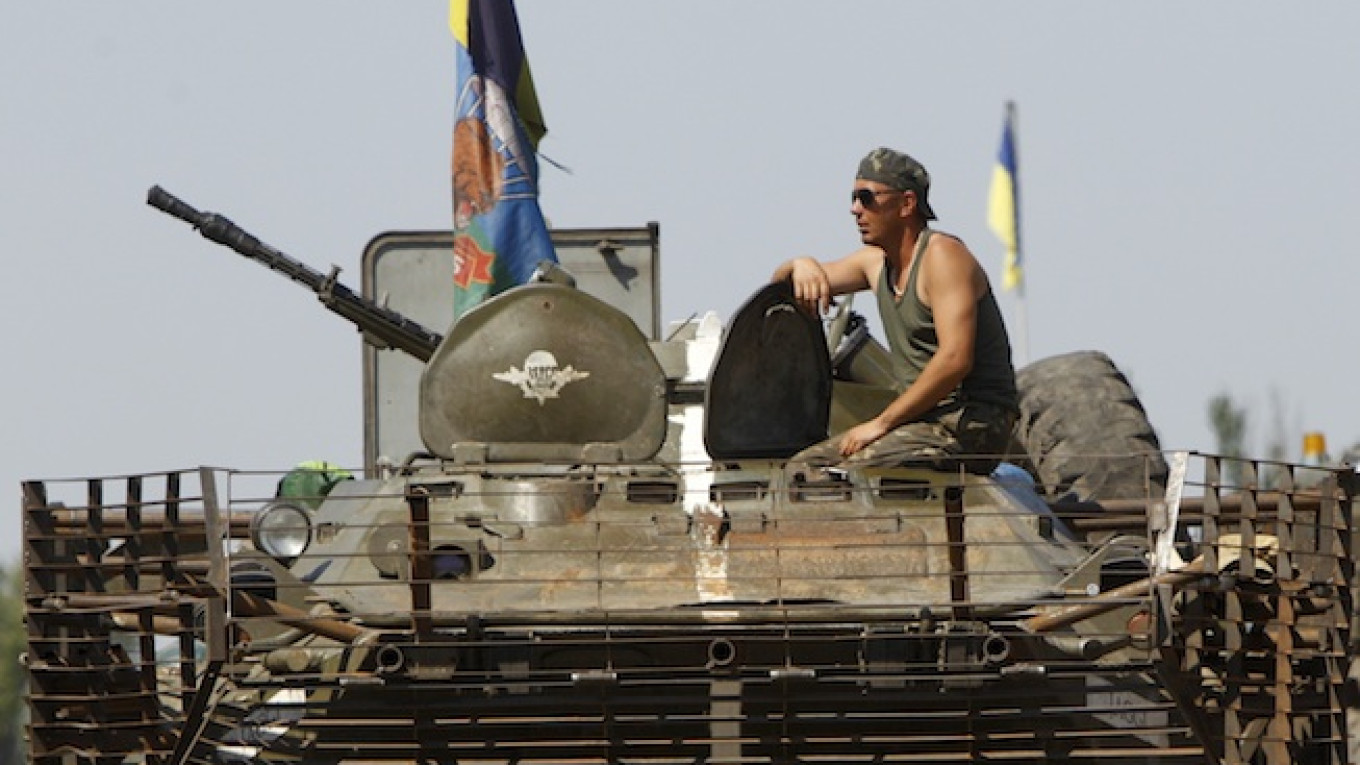As artillery shells slammed into the outskirts of the Ukrainian city of Donetsk, government forces tightened the noose around the rebel-held redoubt and called on pro-Russian separatists to surrender.
To the east of Donetsk, government forces and the separatists were fighting for control of the town of Krasny Luch, a rail and road junction through which Kiev says the rebels are receiving supplies of Russian military equipment.
Talk of a ceasefire, a possibility raised by a separatist leader on Saturday, evaporated as Kiev government forces kept up an offensive to crush the rebels.
Ukrainian military spokesman Andriy Lysenko said that if the rebels wanted a ceasefire this meant "raising white flags and putting down their guns."
There would be no truce while the Ukrainian army continued "punitive" military action, the rebels retorted in a statement.
Donetsk, a major industrial hub in Ukraine's Russian-speaking east, resonated with the crash of shells on its outskirts for about eight hours up to mid-day on Sunday, a witness in the town said.
'Tightening the Circle'
Lysenko said in the past 24 hours, the military had "continued successful offensive operations, considerably tightening the circle around the capital of the Donbass, Donetsk."He added: "The [separatist] fighters are in panic and chaos. There are numerous cases of desertion among the terrorists."
Neither he nor the rebels gave any indication of casualties in the fighting over the weekend.
A statement on the Facebook page of rebel commander Igor Girkin, known as Strelkov, or The Shooter, said: "They have been bombing all morning. There are explosions, some close, some far off. There is news coming in all the time by phone. Just now, we had a fire near hospital No 18, a woman has been killed … ."
Accusing the Ukrainians of maintaining "punitive" operations that endangered the people in Donetsk and threatened a humanitarian catastrophe, a later rebel statement said: "As long as the Ukrainian army is continuing military action there can be no ceasefire."
Ukraine and its Western allies accuse Russia of orchestrating the separatist revolt which erupted in April after Russia's annexation of Ukraine's Crimea peninsula. It says Russia is funnelling tanks and missile systems to the rebels, who have declared independent "people's republics" in the two main industrial regions. Moscow denies involvement.
Donetsk, a once bustling metropolis of nearly one million people, is facing an increasing shortage of food, water and electricity. Few people are on the streets, though groups of armed separatist fighters can be seen, and few cars. Most people are staying indoors or have left the city for the countryside.
Most shops are closed but the municipal authorities said bakeries were still producing bread despite a lack of electricity. Fuel supplies had run out and few chemists are operating. Banks are closed and pensions and social allowances are not being paid.
Battle Underway
Repeating charges of violations of Ukrainian airspace by Russian warplanes, something denied by Moscow, Lysenko said a battle was now underway for Krasny Luch, a junction midway between the two rebel-held cities of Donetsk and Luhansk and a staging post for supplies of Russian military equipment to the rebels, Kiev says.
"If we take this, it will guarantee we can block a route through which the terrorists are receiving aid. Fighting is going on there — very hot fighting," Lysenko said.
"Our forces are doing all they can to take it [the town] as quickly as possible," he said.
Though all sides recognise the seriousness of the humanitarian situation in eastern Ukraine, Kiev and its Western allies suspect Russia could use the situation to move its forces into the country.
Kiev said on Saturday it had headed off, by diplomatic means, an attempt by Russia to send troops into Ukraine under the guise of peacekeepers accompanying a humanitarian convoy sanctioned by the Red Cross. Moscow dismissed the allegation as a "fairy tale."
See also:
A Message from The Moscow Times:
Dear readers,
We are facing unprecedented challenges. Russia's Prosecutor General's Office has designated The Moscow Times as an "undesirable" organization, criminalizing our work and putting our staff at risk of prosecution. This follows our earlier unjust labeling as a "foreign agent."
These actions are direct attempts to silence independent journalism in Russia. The authorities claim our work "discredits the decisions of the Russian leadership." We see things differently: we strive to provide accurate, unbiased reporting on Russia.
We, the journalists of The Moscow Times, refuse to be silenced. But to continue our work, we need your help.
Your support, no matter how small, makes a world of difference. If you can, please support us monthly starting from just $2. It's quick to set up, and every contribution makes a significant impact.
By supporting The Moscow Times, you're defending open, independent journalism in the face of repression. Thank you for standing with us.
Remind me later.


